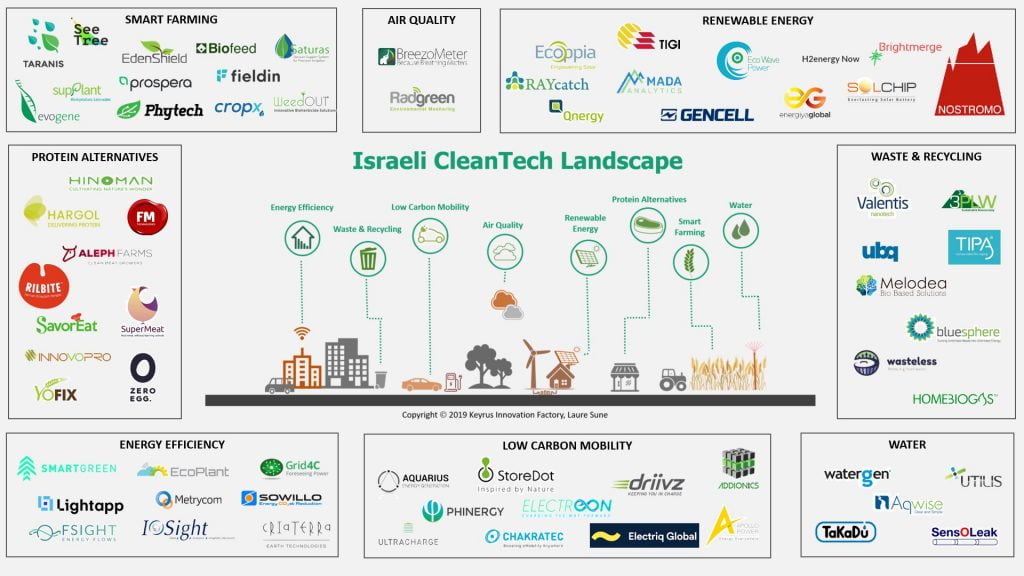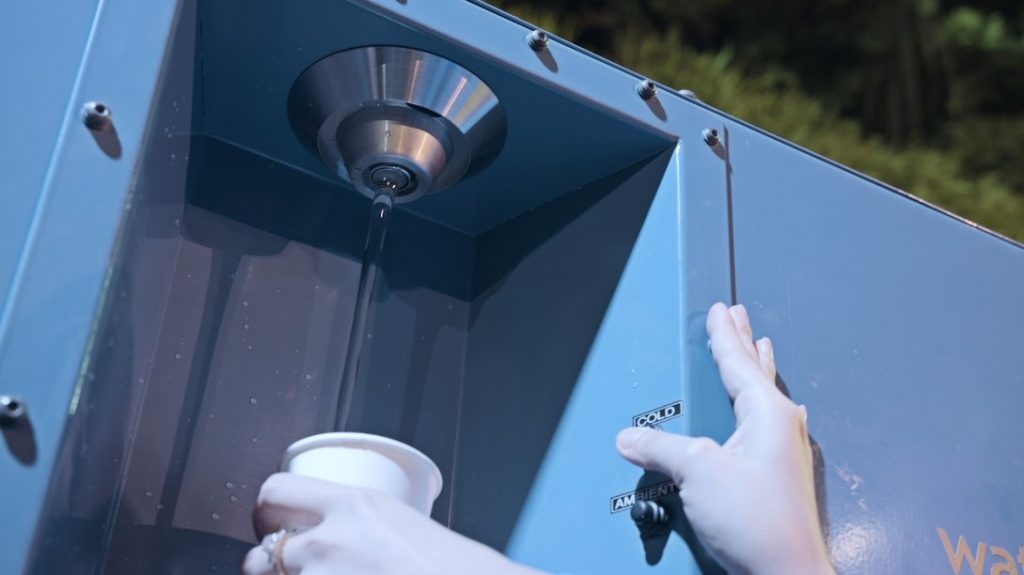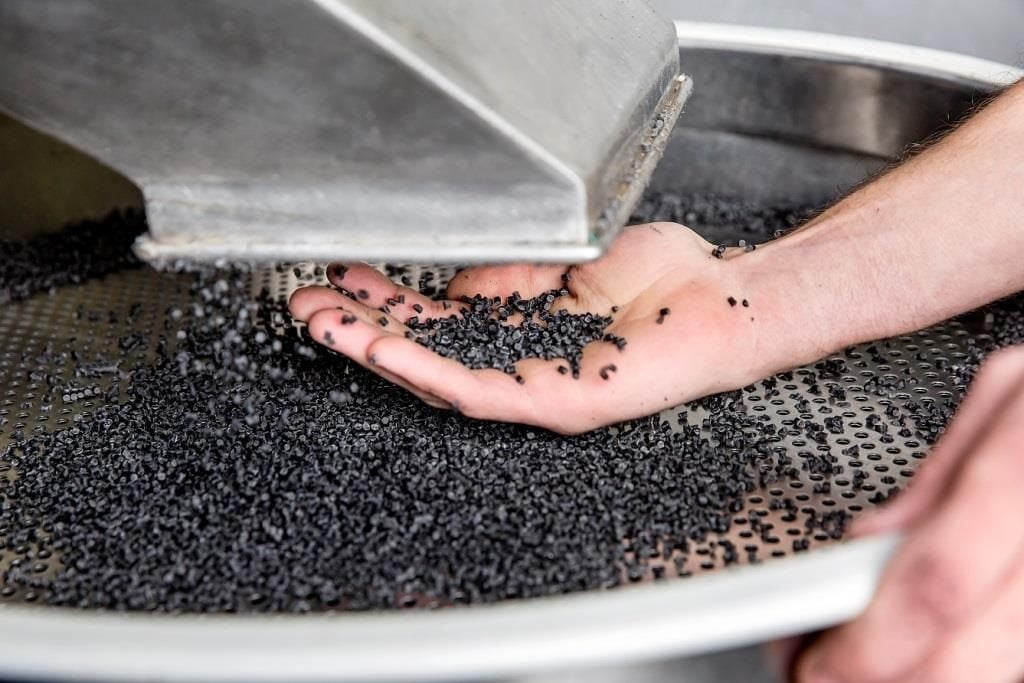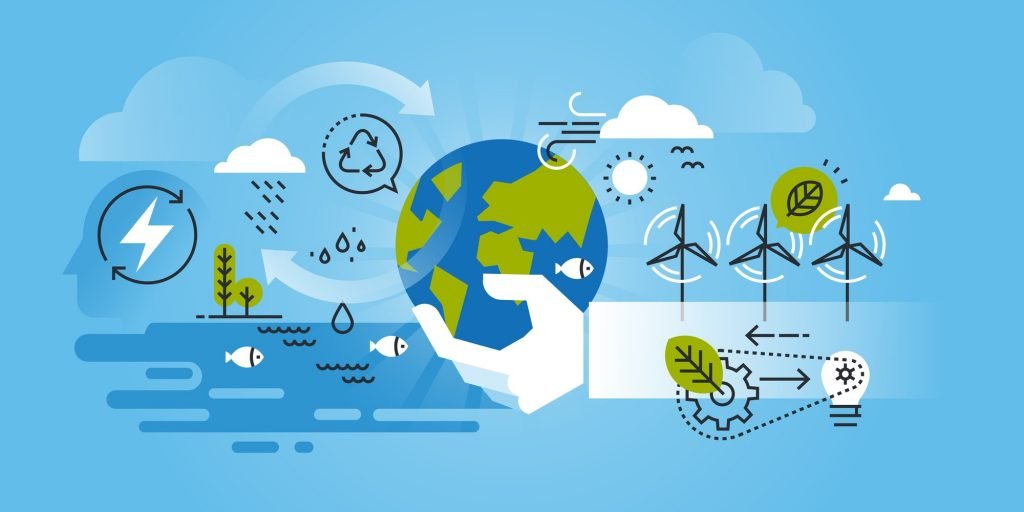This article is a guest post on NoCamels and has been contributed by a third party. NoCamels assumes no responsibility for the content, including facts, visuals, and opinions presented by the author(s).
Laure Sune is a senior consultant and lead analyst at Keyrus Innovation Factory (KIF), a European organization that connects startups to large corporations through open innovation. Keyrus has an office in Tel Aviv. Laure has a strong background in environmental affairs, with five years of experience in sustainable development, energy and green building. She holds an MBA from the University of Belgrano in Buenos Aires.
With over 600 companies and startups in Cleantech (or clean technology, a term that denotes any process, product or service that reduces negative environmental impacts), Israel has over the years gained the status of a high-quality international player in the fields of environmental protection, agriculture, waste management, renewable energy, and water treatment.
Israel, which ranked sixth in the 2017 Global Cleantech Innovation Index, continues to export novel technologies all over the world, having overcome a severe lack of natural resources and an arid climate. One impressive organization doing this work is the Arava Institute for Environmental Studies and its various research centers, which in collaboration with Palestinians, Jordanians, and other international researchers, are dedicated to finding solutions for sustainable agriculture, renewable energy, water management, and desert ecology.
SEE ALSO: 6 Israeli Cleantech Companies Putting Sustainability At The Top Of Their Agenda
Defining Cleantech
Cleantech is not industry-specific. It has emerged as an umbrella term for a variety of different concepts related to environmental challenges, such as resource conservation, resource management, and sustainability.
It is also used to describe ethical investment, which is a form of social sustainability. Indeed, impact investors, who choose to invest in companies, organizations and funds based on environmental and social impact alongside a financial return, spotted the synergy early on. Cleantech startups can find a financial boost with “impact funds.” On the multinational corporations’ side, Cleantech solutions are aligned with strategic CSR (Corporate Social Responsibility) undertaken by private businesses, particularly popular with millennial and Generation Z consumers and clients.
SEE ALSO: European Investment Fund Announces First $20M Equity Investment In Israeli Cleantech
Top Trends
Because Cleantech is cross-sectorial, this map gives a good – but by no means exhaustive – overview of which industries are impacted. Let’s dive in.

1. Smart farming. Conventional farming methods lead to soil degradation, irrigation problems, waste, and pollutants. These can be offset by technology. Smart farming, also known as precision agriculture, addresses issues such as pesticides (which pose major health risks and are harmful to the environment) water scarcity, crop health, crop productivity and so on. Using advanced technologies for collecting data points via satellites, drones, or sensors, smart farming allows for lowering the input (pests, fertilizers, water) while increasing productivity and minimizing harm to the environment. In this space, Israeli companies such as SeeTree, CropX, Taranis, and Evogene stand out.

2. Low Carbon Mobility. The transport sector is responsible for about a quarter of global energy-related carbon emissions. Low-carbon transport can reduce pollution and fight climate change. Electric vehicles, especially, are part of a key trend that still needs to overcome some obstacles. Companies like ElectReon and Chakratec are working toward addressing these challenges. Battery efficiency, combined with an adapted charging infrastructure, should make EVs more competitive in the next few years.
Sign up for our free weekly newsletter
Subscribe
3. Renewable energy. While energy demand is increasing globally, fossil fuels (coal, gas, oil) still count for 80 percent of the energy mix, causing environmental damage. However, the rise of renewable energy, registering a CAGR (compound annual growth rate) of six percent between 2018 and 2025, according to Allied Market Research, could achieve significant emission cuts. From solar farms and wind turbines to hydrogen generators and hydro and wave power plants, there are ways to generate cleaner energy and major tech improvements have made them more competitive and accessible. In addition, solutions such as smart grids and energy-efficient building technologies will reduce and optimize demand.
4. Water efficiency. Water is becoming scarcer and more expensive. Proper wastewater treatment and maintenance are crucial to ensuring enough water will be accessible. Predictive maintenance and leakage alerts aim to preserve and optimize water use. There are also innovative methods, based on purification processes, to increase drinking water (using technologies such as the ones developed by Watergen and Aqwise.)

5. Waste management and recycling. Global trash production is on the rise, wreaking havoc on biodiversity. In our plastic-addicted society, single-use plastic products are everywhere. With only nine percent of plastic recycled, most of it ends up in landfills, rivers, and the ocean. In recent years, a number of initiatives have taken place to reverse this. Engineers are developing new biodegradable materials that would decompose naturally (like sustainable packaging startup Tipa). These materials include corn oil, starch, and plants. Another trend refers to food and green waste, which represents 44 percent of global waste production. Organic waste can be converted into clean electricity, thanks to sophisticated transformation processes (like the waste-conversion technology developed by UBQ Materials.)

6. Protein alternatives. In the FoodTech industry, the current model of meat production is responsible for more greenhouse gases than transportation, according to the United States Environmental Protection Agency. It requires massive amounts of land, food, energy, and water. Amid a rising trend toward vegetarianism, soy burgers, chickpea, and lentils sausages, and even insect proteins are making their mark in the industry. This has been possible with impressive R&D product improvements. A second type of alternative is known as cultured meat (or clean meat) and is expected to be available within a few years. Just look at Aleph Farms and Future Meat Technologies in Israel, and Beyond Meat and Impossible Burger in the US.

Tackling global challenges
The urgency of global warming has never been so clear. The most recent report released by the UN highlights the economic risks of inaction. For example, the forced migration from the Global South is dramatic: political factors aside, droughts and natural disasters are can be a catalyst for violent conflicts. UN forecasts estimate that there could be up to 1 billion environmental migrants by 2050.
This summer, France recorded an all-time highest temperature of 46 ° Celsius, leading to the deaths of 1,500 citizens, according to their health ministry. In Delhi, a new study has revealed that air pollution and its side effects kill 80 people every day. And by the end of 2050, there will be more plastic than fish in the ocean, according to a new report from the Ellen MacArthur Foundation.
In this context, entrepreneurs are seizing the global warming threat as an opportunity to transform society and make a difference. They have ideas, tech, and know-how. Yet Cleantech startups need to scale up in the fight against climate change.
Still, unlike SaaS companies, for example, Cleantech startups struggle with challenges. Infrastructure and hardware solutions are not easy undertakings and there are fewer venture capitalists eager to back these initiatives. But there are exceptions and Israel Cleantech Ventures (ICV) is one of them. By diversifying its portfolio and gaining governmental support, ICV manages to keep Cleantech as its main focus.
SEE ALSO: European Investment Fund Announces First $20M Equity Investment In Israeli Cleantech
The world doesn’t need another online marketplace or mobile gaming app. We need to solve the global warming crisis. It’s not just up to entrepreneurs. Policymakers, investors and leading corporates all have a major role to play in building successful Cleantech startups.
Related posts

Resilient And Nutritious New Plant-Based Milk Aims To Make A Splash

Chocolate From Cultivated Cocoa Comes Without Environmental Toll

Plastic Fantastic: Startup Takes PVC Back To Its Crude Oil Roots




Facebook comments